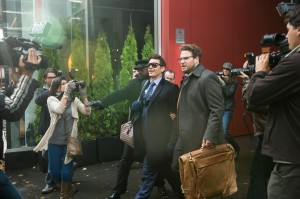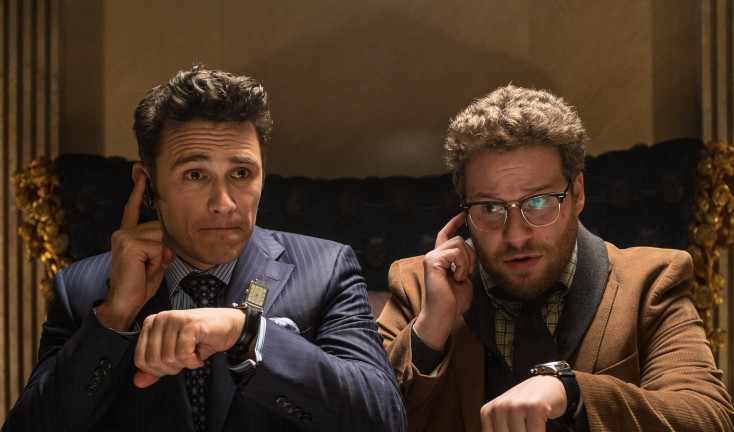
Dave (James Franco) and Aaron (Seth Rogen) in Columbia Pictures’ THE INTERVIEW. ©CTMG. CR: Ed Araquel.
By ANGELA DAWSON
Front Row Features
VANCOUVER, BC—A year before their controversial comedy “The Interview” caught unprecedented heat, actors James Franco and Seth Rogen sat down on location to talk about their collaboration while filming here. (Rogen also serves as co-director, co-writer and is a producer on the film.)
On Wednesday, Sony Pictures Entertainment pulled the film from its scheduled December 25 theatrical release, after several large theater chains decided not to show the film out of concern for moviegoers’ safety following a threat of a Sept. 11, 2001-style attack on theaters by a group calling itself Guardians of Peace.
Unaware of the eventual firestorm their film would ignite, including a devastating hack of Sony Pictures’ computer network by an unknown attacker, the old friends spoke about making of the film.[private]
Franco (“127 Hours,” “Spider-Man”) plays fictional second-rate talk-show host Dave Skylark and Rogen (“Superbad,” “Knocked Up”) is his underachieving producer, Aaron Rapaport, who score an exclusive interview with North Korea leader Kim Jong-Un. When the CIA asks them to assassinate Kim on their interview trip abroad, they become the least qualified men to ever carry out the deed.
Q: When and how did this movie come together?
Rogen: We had the idea for the movie a few years ago and we honestly didn’t know who would be Dave Skylark.
Franco: (to Rogen) You guys were talking about it on (the set of) “This is the End,” right? I wasn’t cast, but you guys were talking about it.
Rogen: Yeah, we had this kind of idea but we didn’t know, honestly. Until the studio saw “This is the End,” we didn’t know for sure if they would let us two direct another movie. So once they saw it, they decided they would let us direct another movie. I think it was around then when we had just made “This is the End,” and we had so much fun with James, it seemed like we were going to direct another movie. We wanted to do with it people we were close with and worked well with, and I think it all came around together then.
Franco: I sort of feel, the way my character was originally written in “This is the End.” He’s a suit-wearing dude, who cares very much about his appearance. I guess that’s how they saw me. I also think they probably felt guilty killing me in “This is the End.”
Rogen: He’s never gotten over that. He literally brought it up five minutes ago.
Q: Were you influenced by the headlines about Dennis Rodman being buddies with Kim Jong-Un?
Rogen: It was actually written before that happened. This was actually written when King Jong-il was still alive, initially. The idea came from reading articles about like Mike Wallace interviewing Osama Bin Laden. Journalists are in a weird position to get closer to these evil dictators than anyone else is, and it was also inspired by the idea that you hear that Saddam Hussein was a fan of Western movies.
You hear that these guys are fans of western culture and pop culture specifically and so we thought an entertainment journalist might be a funny way into that. Then the Dennis Rodman thing happened and it made it much less far-fetched, which was great, honestly. The first part of what we were worried about was that we wanted the movie to somehow exist in the real world. Our fear was like, “Would anyone buy that this would actually happen?” And then when that happened, we were like, that’s way dumber than what we came up with.
Q: Did you base Dave Skylark after anyone in particular?
Rogen: We can of say it’s like Oprah meets Ryan Seacrest a little bit, but amped up crazy. The way Franco ultimately acts in the movie is not based on anyone. It’s psychotic almost, in a wonderful way. But it’s far more heightened than I’ve ever encountered. (To Franco) Actually no, I’m sure you meet people and you think are ridiculous.
Franco: I don’t know anyone like him, but I imagine, like the way this guy is so obsessed with any celebrity gossip. I imagine the offices at TMZ, like we just got the panty-less shot of so and so. You can imagine them celebrating that.
Q: Is there a comedy barometer? Do you know when you’ve gone too far?
Rogen: (laughing) Sometimes.
Q: What do you about Asian or Korean stereotypes?
Rogen: Everything about North Korea in the movie is real. We made up zero facts about North Korean culture, behavior or the belief system. It’s all 100 percent real. As far as the specific jokes, some of the characters in the movie are more racially sensitive than others I guess you would say, like in real life. But overall, we don’t stereotype the Asian characters at all.
Franco: (to Rogen) It’s based on research or things that you found?
Rogen: We just Googled it. Wikipedia mostly.
Franco: The Americans coming in are like “Dumb and Dumber.”
Rogen: Yes, we’re not the smartest guys.
Franco: A lot of the jokes come from that: our ignorance.
Q: Have you ever said anything that is completely beyond NC-17 where you’re like, “This is too far?”
Franco: Uh, no.
Rogen: Well, there have been some crazy jokes.
Franco: You’ve got to try it.
Rogen: He knows we wouldn’t use it if it didn’t work.
Q: How does it feel to shoot back in your hometown here in Vancouver?
Rogen: It’s been nice. It’s cold though. It’s literally snowing right now. It actually works really well for our purposes. The movie is set in New York, China and North Korea. It really just worked geographically for that, because we (producer and co-writer Evan Goldberg) grew up here and we knew there is like a Chinese night market in Richmond where there are thousands of these little Chinese food stands that we filmed for Beijing. We kind of wrote it for things that we knew that existed here. The whole thing takes place in this mountain complex, where Kim Jong-Un’s fortress is, and the mountains and the area we were able to film the finale. It has this scope and it just looks gigantic, which was very nice. So it wasn’t just so we could hang out with our friends and eat good sushi.
Franco: I kept complaining that we weren’t in New Orleans. For a lot of the exterior stuff it wouldn’t have worked, though.
Rogen: (laughing) We are in the bayous of North Korea!
Q: How would you describe this film?
Rogen: We based it more on political thriller, like Ridley Scott or Michael Mann movies. We tried to use a lot of long lenses and we probably play some of the scenes tighter than you generally would in these types of comedies. The fact that it looks serious and has this weight to it makes it funnier, because it really looks like we’re stuck in this serious, political thriller, which is funny to us.
Q: With the success of “This is the End,” do you have more confidence and more freedom from the studio?
Rogen: We always had freedom. We have more confidence in some ways. But at the same time, I really feel like we’re doing something so different with this movie that not a lot carries over, and it really feels like we’re doing something for the first time in a lot of ways.
The fact that we’re almost in a different location every day is a different experience. The plot is a lot more complicated. There are lot more elements. There are scenes, which are cut between five locations instead of us screaming in a house for six weeks straight. So it’s a lot more complicated on our end. Even though we have more confidence it kind of feels new at the same time.[/private]





